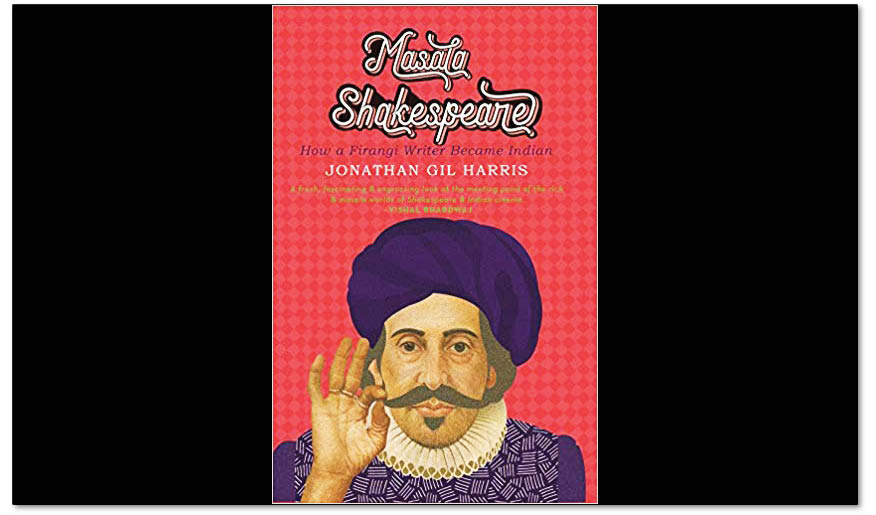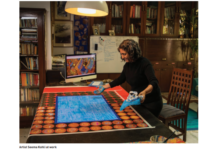
In his new book Masala Shakespeare, author and professor Jonathan Gil Harris looks at how Indian writers and filmmakers have given their own uniquely Indian spins to the Bard’s great plays.
Shakespeare, English-accented, first sailed to the subcontinent with the British more than 400 years ago. Hamlet was supposedly acted on board an East India Company ship in 1607; but onshore performances came only much later. We don’t know which Shakespeare play was first performed in India, nor when or where. By 1775 he was a staple of the Raj playhouses of Calcutta, where British actors performed his plays to largely British colonial audiences. And by 1822, Hindu College in Calcutta had made Shakespeare a part of its English curriculum—the first time in the world that he was included in a university syllabus. Other Indian universities followed suit. Because Shakespeare’s language was often difficult for Indian students, Charles and Mary Lamb’s Tales from Shakespeare (1807), which strip down twenty of his thirty-seven plays to highly readable prose stories, were also prescribed at many colleges, as well as made compulsory reading for the Civil Service Examination. Reciting Shakespeare speeches from memory also became a common teaching tool. At Elphinstone College in Bombay in the 1850s, young Parsi students were made to memorise select passages; this was a prelude to the rote-learning that still remains a feature of Indian education, a pedagogy designed to encourage docile submission to authority.
Arundhati Roy brilliantly parodies the rote-learned Shakespeare of Indian education in a memorable scene from her novel, The God of Small Things (1996). Comrade Pillai shows off to local villagers by getting his young son, Lenin, to recite Mark Antony’s “Friends, Romans, countrymen” speech from Julius Caesar:
Lend me yawYERS;
I cometoberry Caesar, not to praise him.
Theevil that mendoo lives after them,
The goodisoft interred with their bones…
“He shouted it fluently,” writes Roy, “without faltering once. Remarkable, considering he was only six and didn’t understand a word of what he was saying.” Many who have been taught Shakespeare in Indian high schools and colleges might feel the same way about the Shakespeare they have been made to mechanically learn.
As Lenin’s strange version of Shakespeare shows, though, the project of indoctrinating Indians in Shakespeare has also helped spawn strange Anglo-Indian offspring. One can see, or hear, this offspring everywhere. There he is in a street in Kolkata, Shakespeare Sarani (pronounced Shekspeeyair Sharoni). He can be found in Raisina Hill too: former Indian President Pranab Mukherjee, then the finance minister in the Congress-led UPA government, channelled Hamlet when he said of his budget “I must be cruel only to be kind”; Smriti Irani, then the HRD minister in the ruling BJP, accused her opponents of believing, like Macbeth’s witches, that “fair is foul and foul is fair”;Sitaram Yechury, the Communist Party of India leader, also tweaked the Scottish play when criticizing the government’s record on sanitation, averring that ‘All the perfumes of Arabia will not sweeten this little hand.” And Shakespeare has been repeatedly Indianised in Anglophone novels, from Vikram Seth’s staging of Twelfth Night in A Suitable Boy (1993) and Salman Rushdie’s riff on Othello in The Moor’s Last Sigh (1995) to Anjum Hasan’s Hamlet- quoting Mr Das in Neti, Neti (2009), Saikat Majumdar’s grand guignol production of A Midsummer Night’s Dream inThe Firebird (2015), and Preti Taneja’s devastating reimagining of King Lear in We That Are Young (2017).
The Indianisation of Shakespeare isn’t just an English-language phenomenon. His plays have been translated into countless Indian languages and adapted within native performance traditions from the nautanki of north India and the jatra of Bengal to the bhangwadi of Gujarat and the kathakali of Kerala. Shakespeare’s influence is apparent even in the vocabularies of Indian languages. In Hindi, Punjabi, Bengali, and Marathi, as well as several southern Indian languages, “Romeo” has become a term for a swaggering street Casanova—as we have been reminded by Uttar Pradesh’s recent “anti-Romeo” squads, supposedly designed to stop women from being harassed. But nowhere is Shakespeare’s influence more profound than in the cinema. His plays have been adapted for diverse regional-language cinemas, from Malayalam and Tamil and Kannada to Punjabi and Marathi and Bengali; indeed,
Shakespeare is arguably Bollywood’s most successful screenplay writer, with many Hindi-language versions of his plays—and countless more influenced by them—attracting large audiences. Even his words seep into Hindi films: the theme song of the smash hit Three Idiots (2009), which certainly ends well, is the Indian-accented Shakespeare homage, “Aal Izz Well.”
It is easy to see Indian Shakespeare, like the railways or Horlicks or even the English language itself, as simply one of the legacies of British colonialism in India. According to this genealogy, Indian Shakespeare would be the bastard child of the English playwright. But Shakespeare’s presence throughout India is not just the culmination of Thomas Macaulay’s Minute on Education in 1835, in which the colonial official infamously declared that “a single shelf of a good European library [is] worth the whole native literature of India and Arabia”. It also has a lot to do with profound resonances between Shakespeare’s craft and Indian forms of entertainment. Shakespeare has not so much colonised India as he has found a twin in desi storytelling and performance traditions that have reimagined him.
And what joins these twins can be boiled down to one ingredient. One ingredient that is more-than-one: masala.
Extracted with permission from ‘Masala Shakespeare: How a Firangi Writer Became Indian,’ written by Jonathan Gil Harris and published by Aleph Book Company







